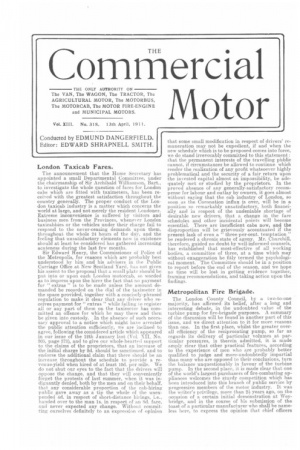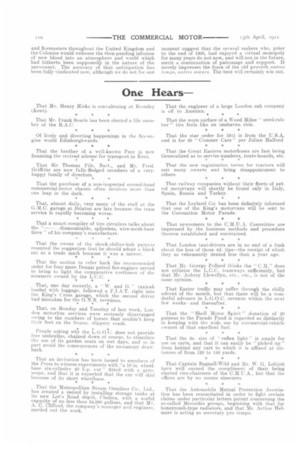London Taxicab Fares.
Page 1

Page 2

If you've noticed an error in this article please click here to report it so we can fix it.
The announcement that the Home Secretary has appointed a small Departmental Committee, under the chairmanship of Sir Archibald Williamson, Bart., to investigate the whole question of fares for London cabs which are fitted with taximeters, has been received with the greatest satisfaction throughout the country generally. The proper conduct of the London taxicab industry is a matter which concerns the world at large, and not merely the resident Londoner. Extreme inconvenience is suffered by visitors and business men from the Provinces, whenever London taxieabbies or the vehicles under their charge fail to respond to the never-ceasing demands upon them, throughout the whole 24 hours of the day, and the feeling that unsatisfactory elements now in existence should at least be considered has gathered increasing acuteness during the last few months.
Sir Edward Henry, the Commissioner of Police of the Metropolis, for reasons which are probably best understood by him and his advisers in the Public Carriage Office at New Scotland Yard, has not given his assent to the proposal that a small plate should be put into or upon each London inotorcab, so worded as to impress upon the hirer the fact that no payment for " extras " is to be made unless the amount demanded be recorded on the dial of the taximeter in the space provided, together with a concisely-phrased regulation to make it clear that. any driver who receives payment for " extras " while failing to register all or any part of them on the taximeter has committed an offence for which he may there and then be given into custody. . In the absence of such necessary approval to a notice which might have arrested the public attention sufficiently, we are inclined to agree, following the considered article which appeared in our issue of the 12th January last (Vol. XII, No. 205, page 373), and to give our whole-hearted support to the claims of the proprietors, that an increase of the initial charge by 2d. should be sanctioned, and to endorse the additional claim that there should be an increase throughout the schedule to provide a revenue-yield when hired of at least 10d. per mile. We do not shut our eyes to the fact that the drivers will oppose the change, and that they will conveniently forget the protests of last summer, when it was indignantly denied, both by the men and on their behalf, that any considerable proportion of the cab-hiring public gave away as a tip the whole of the unexpended 4d. in respect of shortedistanee hirings, i.e., handed over to the man is. in respect of an 8c1. fare, and never expected any change. Without committing ourselves definitely to an expression of opinion that some small modification in respect of drivers' remuneration may not be expedient, if and when the new schedule which is to be proposed comes into force, we do stand irrevocably committed to this statement : that the permanent interests of the travelling phblie cannot, if circumstances be allowed to continue which render the realization of any profit whatsoever highly problematical and the security of a fair return upon the invested capital almost an impossibility, be adequately met or studied by the proprietors. In the proved absence of any generally-satisfactory recompense for labour and outlay by owners, it goes almost without saying that the cab industry of London, so soon as the Coronation influx is over, will be in a position so remarkably unsatisfactory, both financially. and in respect of the undeniable shortage of desirable new drivers, that a change in the fare schedules and other incidental points will become essential. There are insufficient cabs now, and the disproportion will be grievously accentuated if the present lack of even a " three-per-cent. temptation " be rendered a chronic state of agony, Mr. Churchill, therefore, guided no doubt by well-informed counsels, has established that most-effective of all working bodies, a committee of three, at a time which may without exaggeration be fitly termed the psychological moment. The Committee should be in a position to report before the end of the season, and we hope no time will be lost in getting evidence together, framing recommendations, and taking action upon the findings.
Metropolitan Fire Brigade.
The London County Council, by a two-to-one majority, has affirmed its belief, after a long and interesting debate, in the undoubted value of the turbine pump for fire-brigade purposes. A summary
i
of the discussion will be found n another part of this issue, and we direct attention to it for more reasons than one. In the first place, whilst the greater overall efficiency of the reciprocating pump, so far as regards its delivery of particular volumes at particular pressures, is therein admitted, it is made amply clear that other practical features, according to the experience of men who are probably better qualified to judge and more-undoubtedly impartial than ninny who are opposed to their conclusions, turn the balance unquestionably in favour of the turbine pump. In the second place, it is made clear that one of the world's largest purchasers of fire-combating appliances welcomes the sturdy competition which has been introduced into this branch of public service by progressive members of the motor industry. It was the writer's privilege, more than 2.;. years ago, on the occasion of a certain initial demonstration at Weybridge, and in the course of his submission of the toast of a particular manufacturer who shall be nameless here, to express the opinion that. chief officers and firemasters throughout the United Kingdom and the Colonies would welcome the then-pending infusion of new blood into an atmosphere and world which had hitherto been supposedly in the nature of the sacrosanct. The accuracy of that anticipation has been fully vindicated now, although we do not for one moment suggest that the several makers who, prior to the end of 1908, had enjoyed a virtual monopoly for many years do not now, and will not in the future, merit a continuation of patronage and support. It merely impresses the force of the old proverb autre8 temps, mitres 'wears. The best will certainly win out.




















